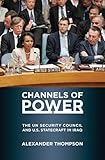Channels of Power : The UN Security Council and U.S. Statecraft in Iraq / Alexander Thompson.
Material type: TextPublisher: Ithaca, NY : Cornell University Press, [2010]Copyright date: ©2011Description: 1 online resource (280 p.) : 10 tables, 3 charts/graphs, 6 line drawingsContent type:
TextPublisher: Ithaca, NY : Cornell University Press, [2010]Copyright date: ©2011Description: 1 online resource (280 p.) : 10 tables, 3 charts/graphs, 6 line drawingsContent type: - 9780801459375
- 956.7044/22 22
- E183.8.I57 T46 2009eb
- online - DeGruyter
| Item type | Current library | Call number | URL | Status | Notes | Barcode | |
|---|---|---|---|---|---|---|---|
 eBook
eBook
|
Biblioteca "Angelicum" Pont. Univ. S.Tommaso d'Aquino Nuvola online | online - DeGruyter (Browse shelf(Opens below)) | Online access | Not for loan (Accesso limitato) | Accesso per gli utenti autorizzati / Access for authorized users | (dgr)9780801459375 |
Frontmatter -- Contents -- Preface -- 1. The Power of International Organizations -- 2. Coercion, Institutions, and Information -- 3. The Security Council in the Gulf War, 1990–1991 -- 4. Coercive Disarmament: The Interwar Years -- 5. The Second Iraq War: Down the UN Path, 2002–2003 -- 6. The Second Iraq War: Bypassing the Security Council -- 7. Conclusion: How the Security Council Matters -- Appendix: Selected Security Council Resolutions -- Bibliography -- Index
restricted access online access with authorization star
http://purl.org/coar/access_right/c_16ec
When President George W. Bush launched an invasion of Iraq in March of 2003, he did so without the explicit approval of the Security Council. His father's administration, by contrast, carefully funneled statecraft through the United Nations and achieved Council authorization for the U.S.-led Gulf War in 1991. The history of American policy toward Iraq displays considerable variation in the extent to which policies were conducted through the UN and other international organizations.In Channels of Power, Alexander Thompson surveys U.S. policy toward Iraq, starting with the Gulf War, continuing through the interwar years of sanctions and coercive disarmament, and concluding with the 2003 invasion and its long aftermath. He offers a framework for understanding why powerful states often work through international organizations when conducting coercive policies-and why they sometimes choose instead to work alone or with ad hoc coalitions. The conventional wisdom holds that because having legitimacy for their actions is important for normative reasons, states seek multilateral approval.Channels of Power offers a rationalist alternative to these standard legitimation arguments, one based on the notion of strategic information transmission: When state actions are endorsed by an independent organization, this sends politically crucial information to the world community, both leaders and their publics, and results in greater international support.
Mode of access: Internet via World Wide Web.
In English.
Description based on online resource; title from PDF title page (publisher's Web site, viewed 26. Apr 2024)


